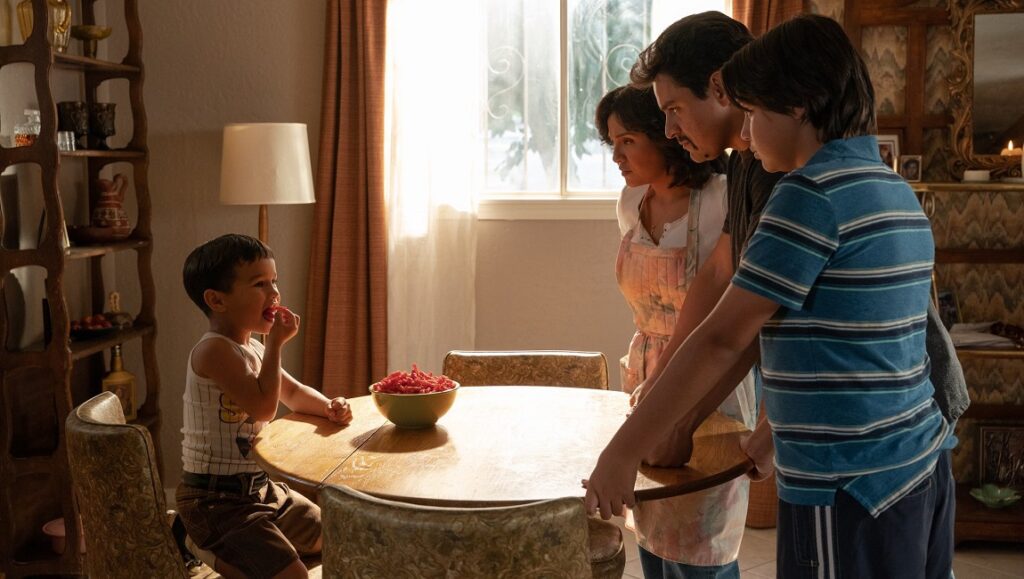A film about the creation of Flamin’ Hot Cheetos sounds like a bit of a farce, the subject matter seemingly better suited for a three-minute sketch at the tail end of a particularly lackluster Saturday Night Live sketch than a major Hollywood production. There have certainly been features made from lesser material — 2008’s Flash of Genius, which chronicled the backstage drama of the intermittent window wipers’ invention, will always win that award — and as they say, a good filmmaker can take any story and make it both cinematically viable and thrillingly entertaining. Flamin’ Hot comes courtesy of actress Eva Longoria, which frankly sounds like the punchline to that joke of a premise itself. Yet this isn’t Longoria’s first foray behind the camera, with the 2022 boxing documentary The Civil War: Chavez vs. De La Hoya is already under her belt, and she brings a fair amount of energy to telling a true-life tale that at times feels like Scarface meets Frito-Lay.
As it happens, the creation of the titular product doesn’t even occur until the film’s midway point. Longoria and screenwriters Linda Yvette Chavez and Lewis Colick are instead far more interested in detailing the inspirational tale of Richard Montañez; his 2021 autobiography Flamin’ Hot: The Incredible True Story of One Man’s Rise From Janitor to Top Executive provides the basis for the script itself. And that subtitle pretty much provides potential viewers with everything they need to know — hey, Richard, ever hear of a spoiler alert? — yet it’s in the details that the film actually manages to shine, with a specificity present in Longoria’s depiction of a culture often portrayed in the broadest and most insulting of strokes.
As a young boy, Richard grew up in a labor camp in the wine vineyards of California. His Mexico-born parents came to the U.S. looking for a better life for their children, but instead found hardship and intolerance around every corner. It certainly didn’t help matters that Richard’s father, Vacho (Emilio Rivera), was a physically and emotionally abusive drunk who saw his son as nothing but a disappointment because he preferred running around and playing over working as a child. It’s also during these years, at the tender age of eight, that Richard meets his soulmate, Judy (Annie Gonzalez), whom he eventually marries. But jump ahead a decade, and Richard is selling drugs and stealing cars, his life seemingly headed toward prison, if not worse. It’s Judy’s sudden pregnancy that forces Richard to get his life together, ultimately leading to him taking a job as a janitor at the local Frito-Lay production facility. While lacking even a high school education, Richard is curious and shows endless initiative in his position, ultimately befriending a gruff plant engineer named Clarence (Dennis Haysbert) who shows him the ins and outs of the machinery, with Richard’s ultimate goal to obtain a position in the manufacturing department. Yet Frito-Lay — owned by soda-bigwig PepsiCo — has come upon hard times financially, with their overall sales dramatically dwindling, resulting in massive lay-offs and the threat of the plant’s closure. Naturally, this inspires Richard to create Flamin’ Hot Cheetos, with the spicy, orange sludge that coats each puff invented in his very own kitchen, with the help of Judy and his two sons.
This eventually lands Richard an audience with the President of PepsiCo, Roger Enrico (Tony Shalhoub) — don’t even begin to ask how he finagles that conversation — where he explains to him that the Hispanic population is both the largest growing in the United States and the one least catered to when it comes to snack foods. Inane? Perhaps. But Flamin’ Hot uses this as a springboard to explore not just the marginalization of Richard and his family, but of the vast Hispanic community dotting every corner of America. Throughout the film, Richard is belittled and mocked for his heritage, his brown skin a neon sign highlighting his supposed shortcomings simply because he has the audacity not to be white, but coming courtesy of Mexican-American writers, actors, and fiilmmakers, there’s a level of authenticity felt in the core of Flamin’ Hot, one that’s too often missing from similar projects motivated by neoliberal appropriation. (The film’s language also employs a mixture of English and Spanish, often within the same sentence; sometimes subtitled, but just as often not.)
Flamin’ Hot, while set in California, was filmed on location in Hispanic neighborhoods across New Mexico, a sense of realism and community present in every frame. Unfortunately, as has become a depressing trend in film as of late, Flamin’ Hot also can’t help but paint the PepsiCo megacorp as some sort of underdog itself, a big business in desperate need of big cash flow, and whose salvation comes in learning how to exploit a new demographic. There’s no denying that it comes across as rather gross, even as Richard’s story resonates, a man who came from nothing and helped to spearhead an inclusive marketing movement. (There really isn’t any way to make that last part not sound cynically calculating.) Longoria manages to keep things moving at a brisk pace, with a number of stylistic tics on display that, while not particularly fresh — we’re talking split-screens, whip-pans, and the integration of on-screen text into the actions of the scene itself — prove there was at least attention paid to film’s visual language, which is a depressingly rare feat in streaming service flicks these days. Flamin’ Hot isn’t going to set the world on fire or linger much in viewers’ minds, but it does prove that messages of inclusivity can resonate, even when packaged with snack foods.
You can currently stream Flamin’ Hot on Hulu.
Published as part of InRO Weekly — Volume 1, Issue 23.
Enjoy our content? Want early access to features, interviews, and more? Support us on Patreon!


Comments are closed.